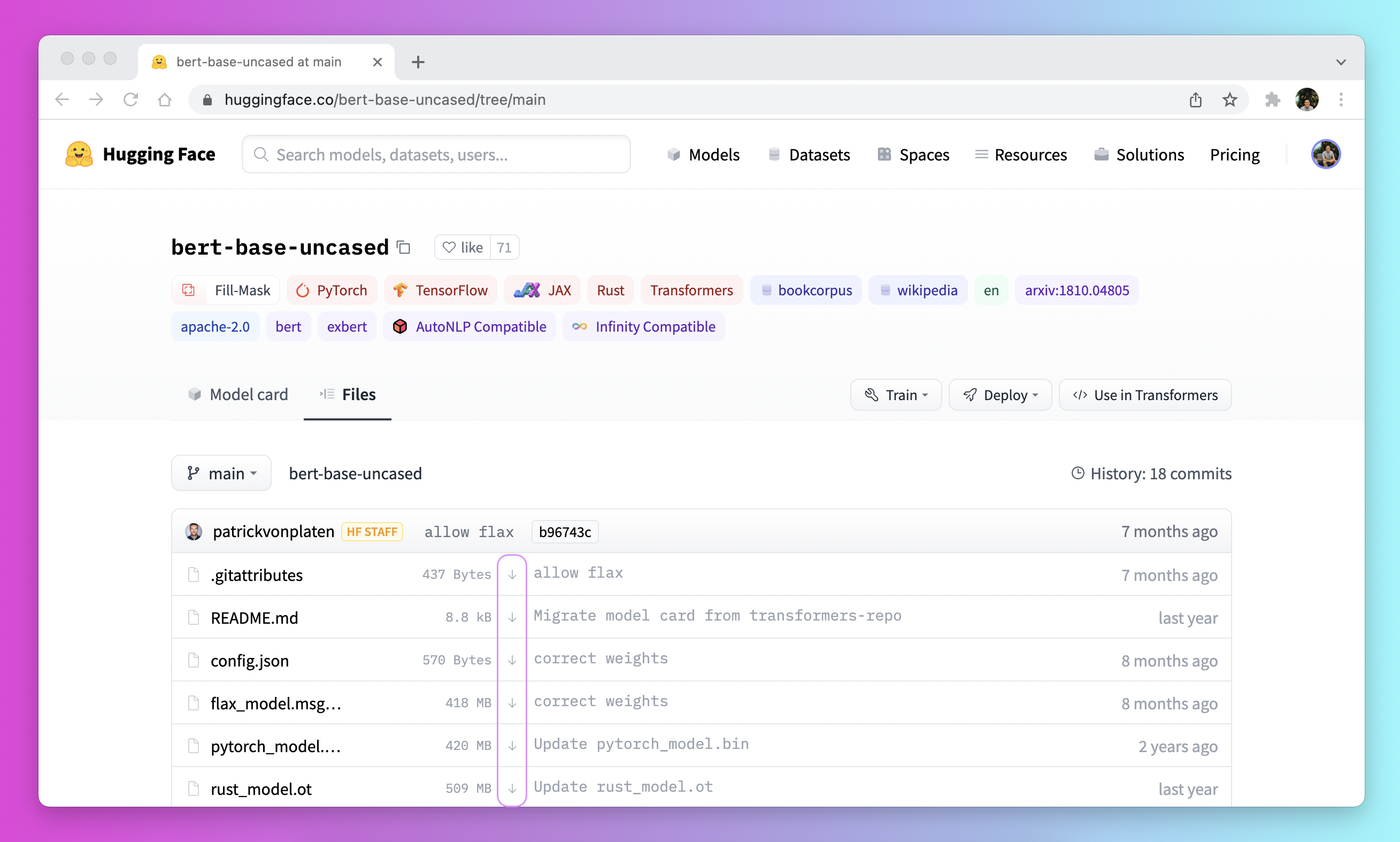Transformers documentation
Installation
Installation
Install 🤗 Transformers for whichever deep learning library you’re working with, setup your cache, and optionally configure 🤗 Transformers to run offline.
🤗 Transformers is tested on Python 3.6+, PyTorch 1.1.0+, TensorFlow 2.0+, and Flax. Follow the installation instructions below for the deep learning library you are using:
- PyTorch installation instructions.
- TensorFlow 2.0 installation instructions.
- Flax installation instructions.
Install with pip
You should install 🤗 Transformers in a virtual environment. If you’re unfamiliar with Python virtual environments, take a look at this guide. A virtual environment makes it easier to manage different projects, and avoid compatibility issues between dependencies.
Start by creating a virtual environment in your project directory:
python -m venv .envActivate the virtual environment. On Linux and MacOs:
source .env/bin/activateActivate Virtual environment on Windows
.env/Scripts/activateNow you’re ready to install 🤗 Transformers with the following command:
pip install transformers
For CPU-support only, you can conveniently install 🤗 Transformers and a deep learning library in one line. For example, install 🤗 Transformers and PyTorch with:
pip install transformers[torch]
🤗 Transformers and TensorFlow 2.0:
pip install transformers[tf-cpu]
🤗 Transformers and Flax:
pip install transformers[flax]
Finally, check if 🤗 Transformers has been properly installed by running the following command. It will download a pretrained model:
python -c "from transformers import pipeline; print(pipeline('sentiment-analysis')('we love you'))"Then print out the label and score:
[{'label': 'POSITIVE', 'score': 0.9998704791069031}]Install from source
Install 🤗 Transformers from source with the following command:
pip install git+https://github.com/huggingface/transformers
This command installs the bleeding edge main version rather than the latest stable version. The main version is useful for staying up-to-date with the latest developments. For instance, if a bug has been fixed since the last official release but a new release hasn’t been rolled out yet. However, this means the main version may not always be stable. We strive to keep the main version operational, and most issues are usually resolved within a few hours or a day. If you run into a problem, please open an Issue so we can fix it even sooner!
Check if 🤗 Transformers has been properly installed by running the following command:
python -c "from transformers import pipeline; print(pipeline('sentiment-analysis')('I love you'))"Editable install
You will need an editable install if you’d like to:
- Use the
mainversion of the source code. - Contribute to 🤗 Transformers and need to test changes in the code.
Clone the repository and install 🤗 Transformers with the following commands:
git clone https://github.com/huggingface/transformers.git
cd transformers
pip install -e .These commands will link the folder you cloned the repository to and your Python library paths. Python will now look inside the folder you cloned to in addition to the normal library paths. For example, if your Python packages are typically installed in ~/anaconda3/envs/main/lib/python3.7/site-packages/, Python will also search the folder you cloned to: ~/transformers/.
You must keep the transformers folder if you want to keep using the library.
Now you can easily update your clone to the latest version of 🤗 Transformers with the following command:
cd ~/transformers/
git pullYour Python environment will find the main version of 🤗 Transformers on the next run.
Install with conda
Install from the conda channel huggingface:
conda install -c huggingface transformers
Cache setup
Pretrained models are downloaded and locally cached at: ~/.cache/huggingface/hub. This is the default directory given by the shell environment variable TRANSFORMERS_CACHE. On Windows, the default directory is given by C:\Users\username\.cache\huggingface\hub. You can change the shell environment variables shown below - in order of priority - to specify a different cache directory:
- Shell environment variable (default):
HUGGINGFACE_HUB_CACHEorTRANSFORMERS_CACHE. - Shell environment variable:
HF_HOME. - Shell environment variable:
XDG_CACHE_HOME+/huggingface.
🤗 Transformers will use the shell environment variables PYTORCH_TRANSFORMERS_CACHE or PYTORCH_PRETRAINED_BERT_CACHE if you are coming from an earlier iteration of this library and have set those environment variables, unless you specify the shell environment variable TRANSFORMERS_CACHE.
Offline mode
🤗 Transformers is able to run in a firewalled or offline environment by only using local files. Set the environment variable TRANSFORMERS_OFFLINE=1 to enable this behavior.
Add 🤗 Datasets to your offline training workflow by setting the environment variable HF_DATASETS_OFFLINE=1.
For example, you would typically run a program on a normal network firewalled to external instances with the following command:
python examples/pytorch/translation/run_translation.py --model_name_or_path t5-small --dataset_name wmt16 --dataset_config ro-en ...
Run this same program in an offline instance with:
HF_DATASETS_OFFLINE=1 TRANSFORMERS_OFFLINE=1 \ python examples/pytorch/translation/run_translation.py --model_name_or_path t5-small --dataset_name wmt16 --dataset_config ro-en ...
The script should now run without hanging or waiting to timeout because it knows it should only look for local files.
Fetch models and tokenizers to use offline
Another option for using 🤗 Transformers offline is to download the files ahead of time, and then point to their local path when you need to use them offline. There are three ways to do this:
Download a file through the user interface on the Model Hub by clicking on the ↓ icon.

Use the PreTrainedModel.from_pretrained() and PreTrainedModel.save_pretrained() workflow:
Download your files ahead of time with PreTrainedModel.from_pretrained():
>>> from transformers import AutoTokenizer, AutoModelForSeq2SeqLM >>> tokenizer = AutoTokenizer.from_pretrained("bigscience/T0_3B") >>> model = AutoModelForSeq2SeqLM.from_pretrained("bigscience/T0_3B")Save your files to a specified directory with PreTrainedModel.save_pretrained():
>>> tokenizer.save_pretrained("./your/path/bigscience_t0") >>> model.save_pretrained("./your/path/bigscience_t0")Now when you’re offline, reload your files with PreTrainedModel.from_pretrained() from the specified directory:
>>> tokenizer = AutoTokenizer.from_pretrained("./your/path/bigscience_t0") >>> model = AutoModel.from_pretrained("./your/path/bigscience_t0")
Programmatically download files with the huggingface_hub library:
Install the
huggingface_hublibrary in your virtual environment:python -m pip install huggingface_hub
Use the
hf_hub_downloadfunction to download a file to a specific path. For example, the following command downloads theconfig.jsonfile from the T0 model to your desired path:>>> from huggingface_hub import hf_hub_download >>> hf_hub_download(repo_id="bigscience/T0_3B", filename="config.json", cache_dir="./your/path/bigscience_t0")
Once your file is downloaded and locally cached, specify it’s local path to load and use it:
>>> from transformers import AutoConfig
>>> config = AutoConfig.from_pretrained("./your/path/bigscience_t0/config.json")See the How to download files from the Hub section for more details on downloading files stored on the Hub.